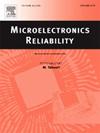Impact of aging on temperature measurements performed using a resistive temperature sensor with sensor-to-microcontroller direct interface
IF 1.6
4区 工程技术
Q3 ENGINEERING, ELECTRICAL & ELECTRONIC
引用次数: 0
Abstract
Temperature measurements play a critical role in guaranteeing system's reliability, for a widespread variety of applications, such as automotive, avionics, etc. Temperature measurements can be conveniently performed at low cost using resistive temperature sensors connected to a microcontroller using sensor-to-microcontroller direct interface (SMDI). However, temperature measurements performed using SMDI may be affected by aging phenomena, such as Bias Temperature Instability (BTI), which may compromise its operation in the field.
Based on these considerations, in this paper we address the case of temperature measurements performed by a resistive temperature sensor connected to a microcontroller by SMDI. We analyze the impact of BTI on the accuracy of the temperature measurements performed using SMDI. We will show that BTI can seriously degrade the accuracy of such measurements, with possible consequences for system's reliability. We then describe a possible strategy to compensate such a degraded accuracy in temperature measurements, thus avoiding its impact on system's reliability.
老化对使用具有传感器-微控制器直接接口的电阻式温度传感器进行温度测量的影响
温度测量在保证系统可靠性方面起着至关重要的作用,适用于各种广泛的应用,如汽车、航空电子等。温度测量可以方便地以低成本执行使用电阻温度传感器连接到微控制器使用传感器到微控制器直接接口(SMDI)。然而,使用SMDI进行的温度测量可能会受到老化现象的影响,例如偏置温度不稳定性(BTI),这可能会影响SMDI在现场的操作。基于这些考虑,在本文中,我们讨论了通过SMDI连接到微控制器的电阻式温度传感器进行温度测量的情况。我们分析了BTI对使用SMDI进行温度测量精度的影响。我们将证明BTI会严重降低此类测量的准确性,并可能对系统的可靠性产生影响。然后,我们描述了一种可能的策略来补偿温度测量中这种下降的精度,从而避免其对系统可靠性的影响。
本文章由计算机程序翻译,如有差异,请以英文原文为准。
求助全文
约1分钟内获得全文
求助全文
来源期刊

Microelectronics Reliability
工程技术-工程:电子与电气
CiteScore
3.30
自引率
12.50%
发文量
342
审稿时长
68 days
期刊介绍:
Microelectronics Reliability, is dedicated to disseminating the latest research results and related information on the reliability of microelectronic devices, circuits and systems, from materials, process and manufacturing, to design, testing and operation. The coverage of the journal includes the following topics: measurement, understanding and analysis; evaluation and prediction; modelling and simulation; methodologies and mitigation. Papers which combine reliability with other important areas of microelectronics engineering, such as design, fabrication, integration, testing, and field operation will also be welcome, and practical papers reporting case studies in the field and specific application domains are particularly encouraged.
Most accepted papers will be published as Research Papers, describing significant advances and completed work. Papers reviewing important developing topics of general interest may be accepted for publication as Review Papers. Urgent communications of a more preliminary nature and short reports on completed practical work of current interest may be considered for publication as Research Notes. All contributions are subject to peer review by leading experts in the field.
 求助内容:
求助内容: 应助结果提醒方式:
应助结果提醒方式:


